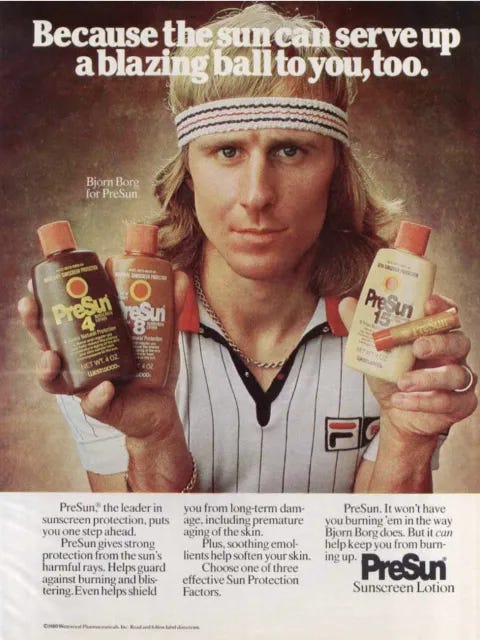Aesthetics of Control & Summer Sunscreen Marketing
The Pivot from Cancer Prevention to Perfume & Sunglasses
Guess what? I turn these newsletters into TikToks occasionally.
It’s early May, which means it’s Skin Cancer Awareness Month, and — if you’ve spent any time in the skincare-adjacent internet — you know what that means: an annual four-week ritual wherein the beauty industry attempts to redeem itself.
Suddenly, every brand becomes a public health advocate. Your favorite skincare podcast drops an earnest episode about melanoma. Sephora curates a “sun safety” kit. Ulta sends a promo code that sounds like a PSA. For a brief, bracketed moment, beauty is framed not as vanity, but as virtue. It’s not about trivial luxuries! It’s about FSA approved medicine!! Or so the copy goes.
But in the last couple years, I’ve noticed that beneath the awareness campaigns and dermcore aesthetics, a new kind of sunscreen marketing has started to emerge. Companies like Vacation® and Supergoop! (Btw — Why do they both have punctation as part of their brandname? Is it an SEO thing? If you know tell me in the comments, please!) have stopped pitching SPF as cancer prevention or even anti-aging, instead pivoting toward something more aspirational and immediate.
In fact, Vacation®’s new line of body mists (which will drop on Tuesday) do not even contain sunscreen. They’re just fragrances with names like Grand Cuvée and After Sun designed to evoke poolside leisure and sunbaked nostalgia. They do not protect you from anything. But — they smell like someone rich, someone who would be protected. (Full disclosure: I really like these scents, although they do not last and you’d be better off ordering my O.G. fave, J. Lo Glow from Ebay.)
I think that’s the point. If you’ve ever worked in fine dining and been told to never say “no problem” to a customer, but rather “my pleasure,” you already understand this logic: people don’t want to be reminded of problems, even in the context of not having any. Nor do they want to be reminded of a problem-adjacent word: prevention. In a world where the future feels abstract or actively collapsing, beauty marketers have figured out SPF marketing that addresses long-term risk isn’t effective. Thus, the shift to short-term optics.
Sunscreen’s transformation from a medical necessity to a lifestyle accessory has been subtle, but fairly total. Where brands once warned us about melanoma, they now use vernacular more associated with cosmetics marketing: glow, radiance, bounce. Supergoop!’s latest launch, Super Shades, isn’t even sunscreen. It's a pair of sunglasses that comes with attachable charms — literal trinkets of personal expression — blurring the line between skincare and self-branding.The charms, apparently, slide open and can be filled with sunscreen. I actually thought these were another Supergoop! April Fool’s joke. Honestly — I’m still not sure they’re real, although they are on the website not to buy but…to think about.

Vacation® goes further, blurring product with a lifestyle brand so aspirational Martha would take note. This is branding as time travel: fonts pulled from Miami Vice credits, a hot pink “SAVE THE DATE” bubble ripped from a Delia’s catalog. The whole thing reads like a nightclub flyer for a velvet rope event — YOU MADE THE LIST! — because what they’re selling isn’t sunscreen. It’s lifestyle cosplay, complete with kitschy text messages that address you as the member of an elite pool club. They also list a number of “sold out” items on their website that are pure fantasy — a Vacation@ Aqua Cycle or Tiki Hut, for example.
Vacation® doesn’t sell sunscreen; it sells a softcore capitalist simulation of status, a Mar-a-Lago daydream for the chronically online. Trumpian maximalism in a bottle. Not wealth, but the fantasy of it. Not leisure, but the performance of having nowhere better to be.




Sunscreen itself hasn’t changed, but it’s story has. And in a world where it’s easier to curate an aesthetic than to imagine a livable future, story is everything.
I truly believe that part of what fuels this shift is a cultural rejection of expertise — especially in MAHA wellness spaces. On one end of the spectrum: dermatologists begging people to reapply SPF every two hours. On the other: Andrew Huberman, Stanford’s resident brain-and-body guru, casually telling listeners he skips sunscreen unless he’s out for more than an hour. His reason? Circadian rhythm. Morning sunlight. Vitamin D.
The implication: if you’re smart enough, optimized enough, you don’t need to follow the rules. You can trust your intuition. You can biohack your exposure. But when prevention becomes performance, the line between self-care and self-commodification disappears.
Like the MAHA movement, this isn’t about science or health. It’s about fantasy. About aesthetic control in a moment when the future feels increasingly out of reach. It’s about looking like you’re planning to be here a while, even if — in fact, exactly because — you’re not sure you will be.










I miss jLo glow <3 also those supergoop supershades are WILD
was Bjorn Borg the inspiration for Richie Tennenbaum's look?